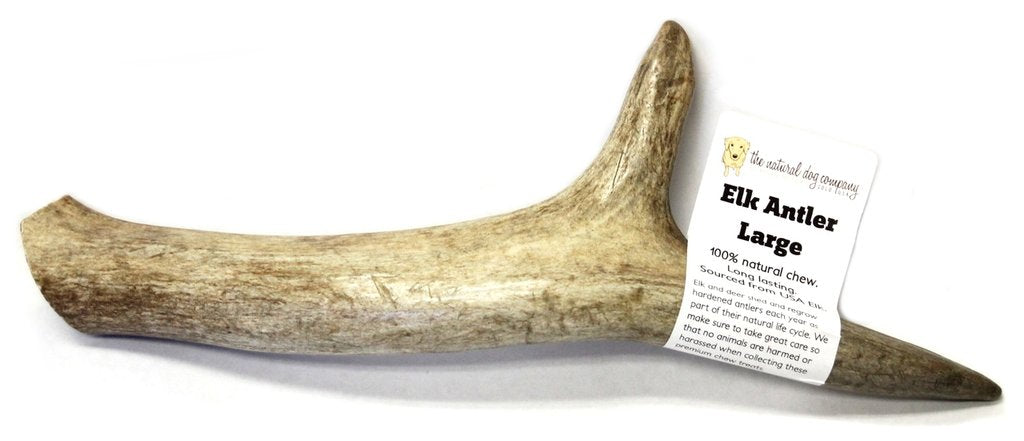


Elk antlers for dogs grown full#
All Antlers are Grade A (Brown / Fresh) Elk antlers and all chews are hand sanded down for your pets safety.īenefits of these natural elk sheds for your dog are they are full of essential vitamins and minerals such as Iron, Calcium, Phosphorus, and Zic that are great for your pet. And for great deals on all-natural dog chews, visit our website.

Want to learn more pet health tips? Check out our blog. If you are unsure what type of antler to buy or if an antler chew is right for your pet, consult with your vet for a recommendation. Elk and deer antlers are rich in protein and a natural source of many different nutrients for healthy dogs. They are a cruelty-free and sustainable chew that will last your dog a long time. Overall, antlers are safe chews for your dog to enjoy with proper supervision. When taking into account the lifespan of these chews, antlers are well-worth the price tag. Once it gets to be quite small, throw it out to avoid it becoming a potential choking hazard.Īntlers are a bigger investment than other chews, but they also last a long time. Also, be sure to keep an eye on the size of the antler over time. This can be avoided by buying split antlers for first-time chewers and observing your dog as they chew to ensure they’re not chewing too hard. Antlers are very hard, and this can mean that if your dog chews too aggressively, they can chip a tooth or hurt their gums. While a safer and more humane chew than rawhide, there are still some things to keep in mind when buying your dog an antler chew. Like any chew, antlers can pose certain risk for dogs. Our reinvented antler program ensures each dog finds the right type of antler to chew, based on their size and chewing tendency.Īre there risks associated with antlers for dogs? With that said, this will depend on the size and cut of the antler, the hardness of the core, and how aggressive of a chewer your dog is. The average lifespan of an antler chew can be as long as six months to a year. Lastly, antlers will last your dog a long time. Be sure to monitor your dog while they chew, and ensure they are practicing safe chewing habits with their antler. Because they grow new antlers every year, these chews are more sustainable for the environment (as well as biodegradable).Īntlers are odorless treats by themselves, however as your dog chews, their saliva will impart a slight odor. Elk and deer antlers are shed naturally every year, so these chews are cruelty-free. Because they are rich in protein, dogs should not chew more than a half-inch or so per day, or else they may get an upset stomach.Īnimal lovers will also appreciate that antlers are a humane and sustainable natural dog chew. Antlers also contain many naturally occurring nutrients , such as zinc, phosphorus, iron, calcium, magnesium, and potassium. They are never treated with harsh chemicals or dyes. They’re simply collected, cleaned, and cut. What are the benefits of antler chews for dogs?Īntlers are a naturally occurring source of protein and amino acids and aren’t processed like rawhide bones. As with any treat, it is important to supervise your dog as they chew, to ensure they are practicing safe chewing habits.

Depending on the level of chewer your dog is, we recommend starting with split antlers so that dogs have easier access to the soft marrow core, and then graduate to whole antlers for aggressive chewers. Whole antlers are full segments of antler, while split antlers are cut in half lengthwise, displaying the marrow. You can also choose from or antlers for your dog. Antlers are also an extremely long-lasting treat in comparison to other dog chews. The short answer – yes, antlers are safe and dogs can chew on them! Deer and elk antlers are considered safer for dogs than rawhide, primarily due to the fact that they don’t easily splinter and are an all-natural chew. But what about antlers? Keep reading to find out if antlers are safe for your dog to chew. Rawhide bones aren’t easily digestible and can cause deadly blockages in the digestive system. Some typical dog “treats” can actually pose major health risks for your pet.


 0 kommentar(er)
0 kommentar(er)
